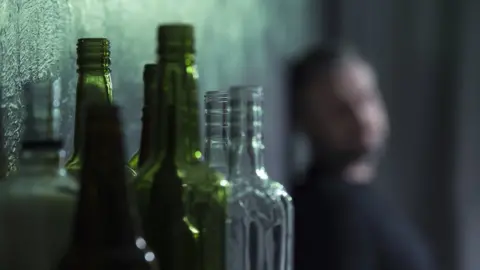'Notable' fall in Scotland's alcohol death rate
 Getty Images
Getty ImagesThe number of deaths caused by alcohol misuse in Scotland fell by 10% last year, according to new statistics.
Figures published by National Records of Scotland reveal 1,020 deaths in 2019 were linked to alcohol abuse.
The data also highlights 833 probable suicides - a small increase (6%) for a second year in a row.
And a total of 2,726 accidental deaths were recorded, a rise of 8.5%, with the majority caused by accidental poisonings or falls.
Pete Whitehouse, director of statistical services, welcomed the "notable" fall in the alcohol-specific deaths but said it was too early to tell if it can be maintained.
Minimum unit pricing
He said: "Since our records began in 1979, there have only been three other occasions where we have seen a reduction in the number of alcohol-specific deaths of around 10% or more in a single year.
"However, although an annual decrease of this magnitude is notable, further data will be required to see if this reduction continues and whether we will see a sustained shift in alcohol-specific deaths in Scotland."
Alcohol-specific deaths are those which are known to be a direct consequence of alcohol misuse, while alcohol-related deaths includes those which are only partially caused by abuse of alcohol.
The drop in alcohol-specific deaths in Scotland is the first substantial decrease in that category since 2012.
It follows the introduction of minimum unit pricing by the Scottish government in May 2018 a bid to cut consumption and save lives.
In January it emerged the amount of alcohol sold in Scotland's shops fell during the first year of minimum pricing but sales increased south of the border.
The NRS report also recorded the second successive annual increase in the suicide figures, following a downward trend since the early 2000s.
And the data shows that, after adjusting for age, the death rate for people in the most deprived areas was 1.9 times that of those in the least deprived areas.
This gap has gradually increased over time from a ratio of 1.6 in 2000.
The 2020 annual report will include data from first 10 months of the Covid pandemic, which some experts fear will be responsible for an increase in alcohol abuse and suicides.
Alison Douglas, chief executive of Alcohol Focus Scotland, described the figures as "very encouraging".
"The evidence from the evaluation of minimum unit pricing so far has shown that it is having the intended effect on alcohol consumption, and now it looks like we may be beginning to see this translate into health benefits."
She called for the 50p minimum price to be reviewed as it is likely to have been "eroded due to inflation" since MSPs passed the Alcohol (Minimum Pricing) (Scotland) Act in 2012.
'Hidden in plain sight'
Scottish Families Affected by Alcohol and Drugs said the new statistics meant more than 10,784 alcohol deaths had now been recorded between 2010 and 2019.
Chief executive officer Justina Murray said: "Scotland's ongoing unhealthy relationship with alcohol means that alcohol harm and alcohol deaths are hidden in plain sight.
Last year, a report found Scotland has the highest rate of alcohol-specific deaths in the UK although rates have improved significantly in the past two decades.
Meanwhile, the NRS figures show that men accounted for nearly three quarters (74%) of probable suicides in 2019 and nearly a third (32%) of the total were aged between 45 and 59.
National Suicide Prevention Leadership Group chairwoman Rose Fitzpatrick said people need to be encouraged to talk about the issue and seek help.
She added: "Suicide prevention has never been more important.
"While today's figures predate Covid-19, the pandemic is likely to have a long-term impact on wellbeing and mental health as people's lives change."
'Source of shame'
Scottish Conservative mental health spokesman Brian Whittle said the statistics should be a "source of shame" for the SNP.
Scottish Greens health spokeswoman Alison Johnstone said there was an "urgent need" for the Scottish government to improve access to mental health services.
And Scottish Liberal Democrats health spokesman Alex Cole-Hamilton called for a "serious expansion" in the number of dedicated NHS mental health staff and described the suicide figures as "devastating".
Rachel Cackett, executive director of Samaritans Scotland, said: "It's particularly concerning to see rates of suicide increase for almost all age groups and for rates among young people under 25 continuing to rise this year.
"And, as in previous years, people living in the most deprived communities in Scotland continue to be around three times more likely to take their own life, compared to those living in the wealthiest communities."
'Significant toll'
The Scottish Children's Services Coalition said the situation had worsened due to the coronavirus crisis and warned that further cuts in services would create a mental health "perfect storm".
And Councillor Stuart Currie, Cosla's health and social care spokesman, highlighted the link to poverty and the profound grief behind the statistics.
Mental Health Minister Clare Haughey said: "While these statistics do not reflect the period of the coronavirus pandemic, we know that this is taking a significant toll on many people's mental health and we are doing all we can to support people at this difficult time.
"We are not being complacent and, together with Cosla, we accepted the recommendations that the National Suicide Prevention Leadership Group put forward for a pandemic-specific suicide prevention response."
